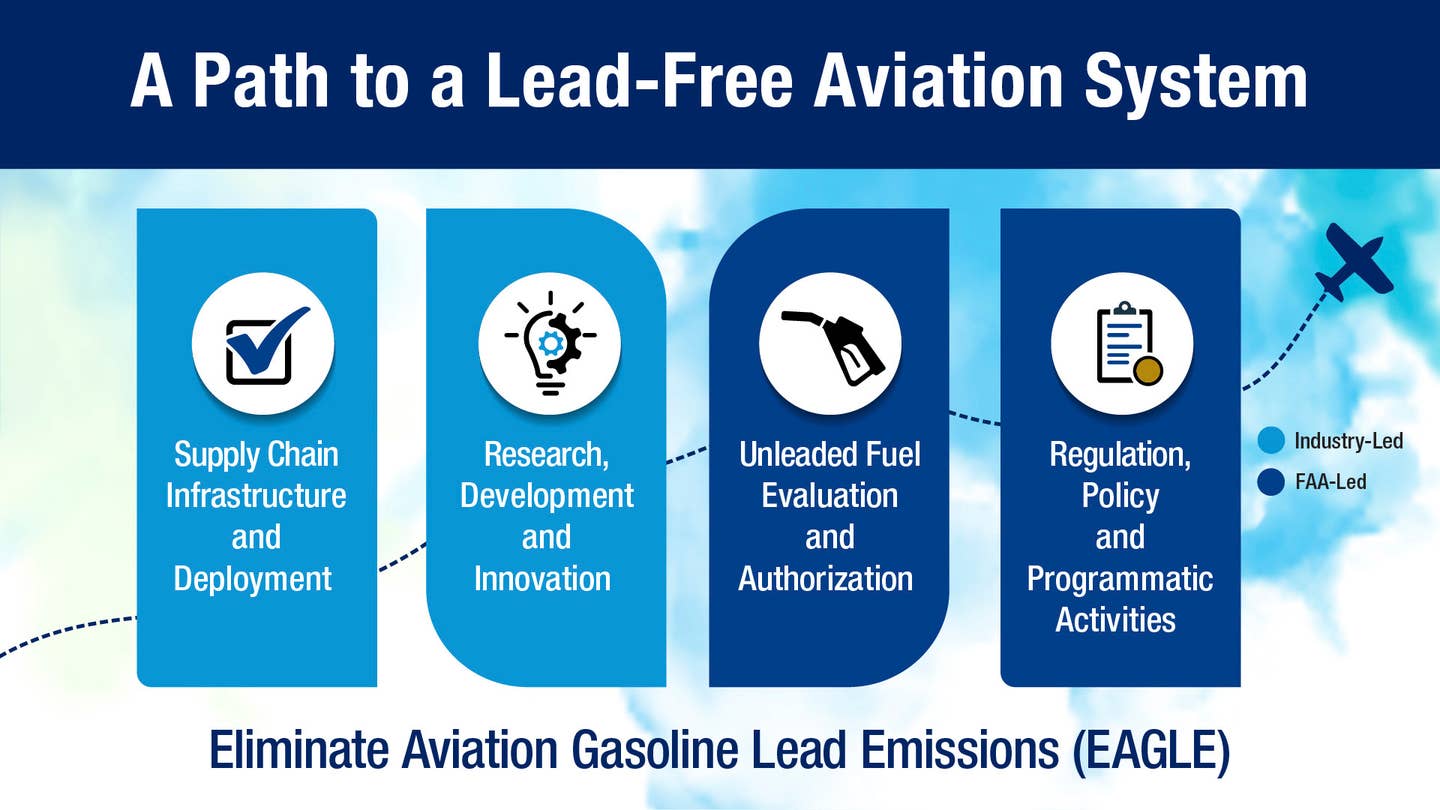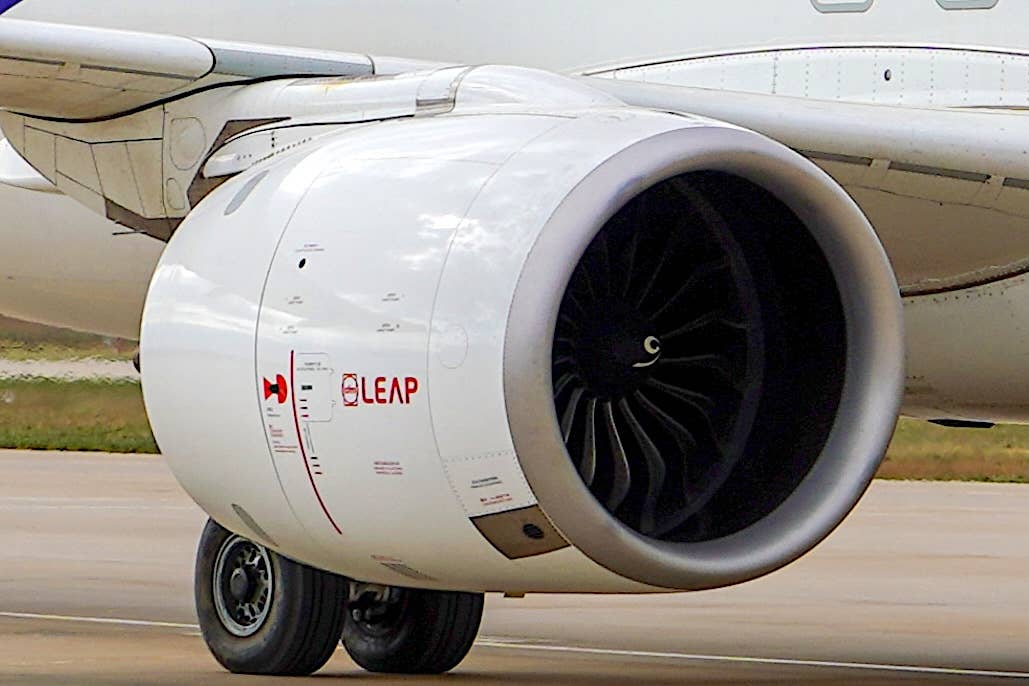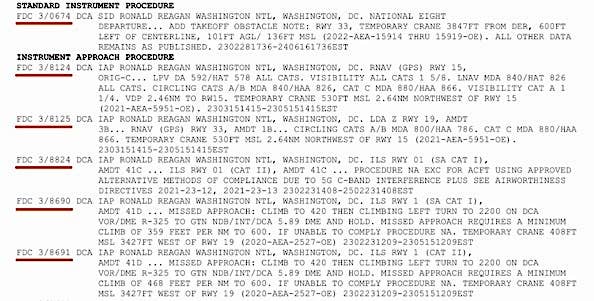EAGLE Update Stresses OEM Approval For Unleaded Fuels
EAGLE has issued an update on its work toward an unleaded replacement for 100LL.

The Eliminate Aviation Gasoline Lead Emissions (EAGLE) group seems to be suggesting that OEMs, not the FAA, will have the final word on the approval of unleaded replacement fuels for 100LL developed through the STC process. In an update posted late last week, the group, of which the FAA is a central member, described OEMs as "the key players in this process, and their comfort with these new fuels will drive this monumental shift."
Swift Fuels' 100R recently received an STC for late-model Cessna 172s, and GAMI received an STC for all aircraft engines and airplanes on the FAA registry in 2022. All piston helicopter engines are included in the STC but it has not yet been expanded to include helicopter airframes. But EAGLE says the STC, which is a formal certification process with all the weight that presumably carries, is just part of the solution.
"It is not enough for the FAA to approve these new fuels. The industry—from aircraft owners to fuel distributors to FBOs that dispense fuel and aircraft manufacturers that provide continued operational support—must accept them. Safety, reliability, and commercial viability must guide this transition, ensuring that by the end of 2030, piston-engine aircraft can take to the skies with unleaded fuel that is dependable. The future of general aviation depends on it," the update says.
Only LyondellBasell is testing a fuel through the Piston Aviation Fuel Initiative (PAFI) process. The testing is being carried out at the FAA's engine labs in New Jersey and it's still early in that testing. LyondellBasell raised some eyebrows in July when it said that creating a truly drop-in unleaded replacement for 100LL (a key goal of EAGLE) is "impossible" and that performance limitations will be imposed for some engines. It is continuing to pursue PAFI testing that, if successful, will lead to a "fleet approval" by the FAA. GAMI says its fuel is a true drop-in replacement that outperforms 100LL.
LyondellBasell and Swift have both submitted their fuels to ASTM International for a specification. LyondellBasell said in August that it's working on addressing criticisms leveled in the first round of balloting by the consensus standards group. Swift has declined to comment on the results of its first balloting. GAMI says it has no intention of submitting its fuel to ASTM because it doesn't trust the process and the FAA's review leading to the STC was more thorough and up-to-date than ASTM's.
EAGLE also has some cautionary advice for those who have or are thinking of buying either the Swift or GAMI STC. "Aircraft owners must stay informed and engaged as this transition unfolds," the update reads. "It is important that they educate themselves on any restrictions that may accompany an STC and comply with any OEM directives that may be issued." Both Cirrus Aircraft and Lycoming have said GAMI's fuel will void their warranties, but there have been legal opinions that question that assertion.
The full EAGLE update is copied below:
The Path to Unleaded Avgas: A Critical Transition for Aviation
The aviation community has long recognized the need to eliminate lead emissions from piston-engine aircraft, a goal set to be achieved by the end of 2030 through the leadership of the Eliminate Aviation Gasoline Lead Emissions (EAGLE) initiative. This ambitious endeavor brings together government and industry partners committed to finding a safe and reliable unleaded aviation fuel that is viable throughout the aviation supply chain.
As the general aviation community works toward this goal, the role of aircraft owners cannot be overstated. They are, after all, the ultimate end-users of any new fuel, and their buy-in will be critical to its success.
This transition is about more than meeting regulatory requirements—it’s about ensuring that aircraft owners feel confident in the safety and reliability and availability of the new fuel. The solution must be robust enough to meet the diverse needs of the piston-engine fleet, ranging from the World War II era planes to modern helicopters.
Currently, there are three promising unleaded fuel candidates. Their developers are pursuing either the Fleet Authorization (FA) under the Piston Aviation Fuels Initiative (PAFI) or the traditional Supplemental Type Certification (STC) process via an approved model list (AML). Both pathways ensure that engines and aircraft can safely operate on the new fuel, however, regardless of the path to approval to use in the aircraft, consumer acceptance will hinge on more than FAA approval.
Fuel developers must not only prove their products’ safety and compatibility with the existing fleet but also demonstrate to key industry stakeholders that their product is reliable. Aircraft owners need assurance that switching to a new fuel won’t void manufacturer warranties. They also need to be confident that it won’t cause damage to paint, electronics, engine components or fuel systems. The aviation supply chain will need assurances as well. This next fuel must be produced, distributed, stored, possibly comingled with other fuels, pumped, and consumed without causing damage or requiring significant equipment modifications. Industry stakeholders understand that any new fuels must meet the needs of aircraft owners and be compatible with production, distribution and dispensing systems.
EAGLE has worked diligently over the past 18 months to keep stakeholders informed, providing updates on the progress of key unleaded fuel developers. General Aviation Modifications Inc.’s (GAMI) G100UL and Swift Fuels’ 100R are advancing through the STC process. GAMI has already secured a broad Approved Model List (AML) STC for its fuel in 2022 for piston engines and airplanes. Recently, the FAA granted Swift Fuels its first STC for the use of its 100R in Cessna 172 R & S model aircraft powered by Eliminate Aviation Gasoline Lead Emissions (EAGLE) Lycoming IO-360-L2A engines, with many additional engines and airframes being evaluated for approval in the weeks ahead. LyondellBasell/VP Racing’s UL100E is progressing through the PAFI pathway, having completed about 25 percent of critical materials compatibility and full-scale engine detonation and performance testing. Both Swift Fuels and LyondellBasell/VP Racing have also begun working through ASTM International on the development of an industry consensus production specification for their respective fuels.
The recent updates from EAGLE provide optimism. To learn more visit: flyEAGLE.org (See Stakeholder Meetings). Progress is being made, and general aviation’s path to acceptance of unleaded fuel continues.
Congress and the FAA’s commitment to this initiative is underscored by the 2024 FAA Reauthorization, which supports the continued availability of 100-octane low-lead (100LL) avgas until the end of 2030, or when a certified unleaded alternative is available at airports. (Alaska, a state heavily reliant on piston-engine aircraft, has been given a slightly extended timeline protecting continued availability of 100LL through the end of 2032). However, the collaborative industry/government EAGLE goal is clear: the elimination of leaded aviation fuel by the end of 2030.
General aviation is moving to ensure a safe, reliable transition to unleaded avgas without jeopardizing the operational safety of the piston-engine fleet. Aircraft owners must stay informed and engaged as this transition unfolds. It is important that they educate themselves on any restrictions that may accompany an STC and comply with any OEM directives that may be issued. They are the key players in this process, and their comfort with these new fuels will drive this monumental shift.
It is not enough for the FAA to approve these new fuels. The industry—from aircraft owners to fuel distributors to FBOs that dispense fuel and aircraft manufacturers that provide continued operational support—must accept them. Safety, reliability, and commercial viability must guide this transition, ensuring that by the end of 2030, piston-engine aircraft can take to the skies with unleaded fuel that is dependable. The future of general aviation depends on it.






